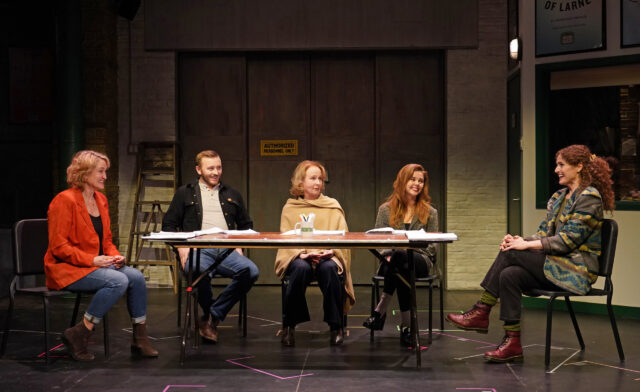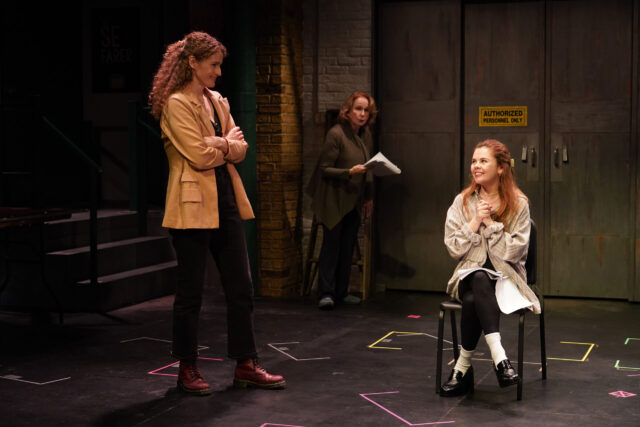
The Dublin-based Irishtown theater company prepares to stage a play in New York in Irish Rep world premiere (photo by Carol Rosegg)
IRISHTOWN
Irish Repertory Theatre, Francis J. Greenburger Mainstage
132 West Twenty-Second St. between Sixth & Seventh Aves.
Wednesday – Sunday through May 25, $60-$125
212-727-2737
irishrep.org
Ciara Elizabeth Smyth’s Irishtown, making its world premiere at the Irish Rep through May 25, tackles an issue that the theater company probably faces regularly: How Irish must a play be to be staged at the Irish Rep? How far does its cultural responsibility extend, and, perhaps most important, can it be a comedy?
As one of the characters asks the writer during rehearsals of the play within the play, a contemporary legal drama about sexual assault in Hertfordshire, England, “Where’s the lyricism? Where’s the backward syntax? And I’m sorry, I know I’ve said it before, but a happy ending? Do you know one happy Irish person?”
The ninety-minute show is set at the offices of the Dublin theater company Irishtown. Actors Constance (Kate Burton), Síofra (Saoirse-Monica Jackson), and Quin (Kevin Oliver Lynch) are completing a table read with director Poppy (Angela Reed) and playwright Aisling (Brenda Meaney) of Aisling’s latest work, Who Are We if We Are Not Ourselves at All, which is scheduled to open in New York City in four weeks.
The actors’ initial fawning displays of support soon give way to underhanded comments, sideways digs, and outright suggestions for changes, which infuriates Aisling, who insists the script will be locked and that the story is based on her own real-life experiences. Constance, an Irish legend who is struggling to pay for care for her ailing mother, is worried that “the script isn’t displaying as ‘authentically’ Irish” and that Poppy is English. Quin, who is bad at accents and has just been dumped by his girlfriend, complains about the script, “I think everything is wrong with it.”
Even Síofra, who is Aisling’s girlfriend and has been named Newcomer of the Year twice — ten years apart — and Poppy, who was kicked out of the Royal Shakespeare Company for having sex with numerous cast members, get in on the attacks.
Quin: We have one card in America, the Irish card, and you didn’t even play it? Even the English are playing the Irish card.
Poppy: Are they?
Constance and Síofra: Yes.
Aisling: Hang on now, not everything I write needs to be about being Irish.
Quin: But we are Irish.
Aisling: But if Irish drama needs to define Irish identity and its claims of independence from Britain, what further declaration of independence can there be than an Irish play not desperately seeking to be Irish?
Síofra: It’s a balance though, isn’t it? You want to represent Ireland as a home of ancient idealism with a rich cultural heritage but not tip it over into depicting us as buffoons of easy sentiment or drunken fucking monkies.
As the trip to New York inches closer and Aisling battles the producer, McCabe (voiced by Roger Clark), she decides to walk off with her script, leaving Constance, Quin, Síofra, and Poppy to come up with their own Irish play in a week.

Constance (Kate Burton) watches carefully as playwright Aisling (Brenda Meaney) and her girlfriend, Síofra (Saoirse-Monica Jackson), share a moment (photo by Carol Rosegg)
As always with the Irish Rep, the production is stellar. Colm McNally’s dingy, basement-like office set, featuring posters of such Irish classics as Waiting for Godot, Dancing at Lughnasa, and The Beauty Queen of Leenane — in addition to Aisling’s The Happy Leper of Larne — has a claustrophobic feel as time is running out; McNally also designed the lighting, with sound by Caroline Eng and casual costumes by Caroline Eng, highlighted by Aisling’s sweaters.
The cast is led by Burton (Hedda Gabler, The Elephant Man) as the careful Constance, Reed (Harry Potter and the Cursed Child, The Power of Darkness) as the tough but vulnerable Poppy, and the ever-dependable Meaney (Little Gem, The New Morality) as the defensive Aisling.
Even at only ninety minutes, the play, directed by Nicola Murphy Dubey (Belfast Girls, Pumpgirl), gets bogged down in slapstick while a few subplots get short shrift and the ending is rushed. But Smyth (Lie Low, We Can’t Have Monkeys in the House) has a lot to say about celebrating, and being honest about, personal and cultural identity, as exemplified by the title of the play within the play, Who Are We if We Are Not Ourselves at All. When Poppy talks about having “inherited” the cast, an English director in charge of an Irish crew, it brings up centuries of conflict.
But Quin sums it up best when he asks, “We could just devise an Irish play . . . How hard could it be?”
The Irish Rep knows the answer.
[Mark Rifkin is a Brooklyn-born, Manhattan-based writer and editor; you can follow him on Substack here.]